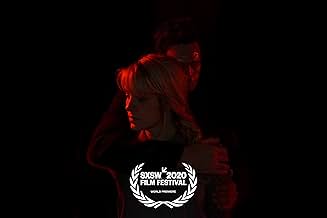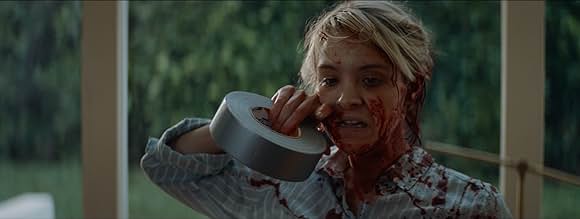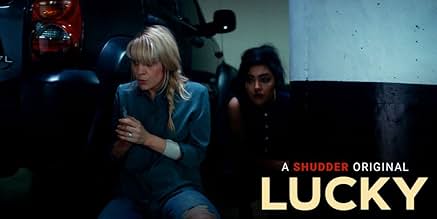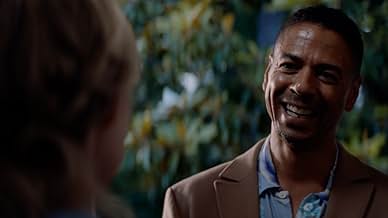IMDb-BEWERTUNG
4,9/10
2993
IHRE BEWERTUNG
Eine Frau kämpft darum, dass ihr geglaubt wird, als sie feststellt, dass sie von einer bedrohlichen Gestalt verfolgt wird, die Nacht für Nacht in ihr Haus zurückkehrt.Eine Frau kämpft darum, dass ihr geglaubt wird, als sie feststellt, dass sie von einer bedrohlichen Gestalt verfolgt wird, die Nacht für Nacht in ihr Haus zurückkehrt.Eine Frau kämpft darum, dass ihr geglaubt wird, als sie feststellt, dass sie von einer bedrohlichen Gestalt verfolgt wird, die Nacht für Nacht in ihr Haus zurückkehrt.
- Auszeichnungen
- 1 Nominierung insgesamt
Leith M. Burke
- Rob
- (as Leith Burke)
Nikea Gamby-Turner
- Detective
- (as Nikea Gamby Turner)
Empfohlene Bewertungen
Writer and protagonist Grant has something to say about violence against women-- something to say about the ways that some women are hobbled by fear of violence. Unfortunately, what Grant has to say is not clear.
Is Lucky a study on the meaningless surreality of some of these fears, that their focus is on some masked stranger in a parking garage rather than on one's husband, the vastly more likely source of violence? Or is Lucky instead arguing that those masked strangers are inappropriately disregarded as a legitimate source of fear? Does Lucky argue that women need to stick together to escape their chains? Or does it instead tell us that women should "Go It Alone" because solidarity is hopeless? When Grant angrily insists that her success is 100% a function of her hard work, are we as the audience supposed to be cheering for her self-regard or shaking our heads at her self-importance? Are we invited to think that all men (save our husbands, of course) are responsible for our fear, or are we instead asked if we're failing to see "Schrodinger's Rapist" as something other than an object-- a man with a face, many men with many faces?
Maybe Grant isn't sure about any of that, and Lucky is just asking a lot of questions. Maybe it's less of a manifesto, more of a meditation. But if so, even that uncertainty is unclear. Lucky merely allows us to be reminded of our own questions-- or of our own certainty regarding the answers-- and if we have none, then Lucky doesn't do anything to change that.
That might be okay sometimes. Like Inglorious Basterds, Lucky seems to be fine with you ignoring the critical questions. In Lucky's case, in favor of just watching a poppy, PG-13 thriller. Unfortunately, Lucky doesn't travel the traditional scales of pop. It is a thought experiment, with little relationship to reality, yet never embraces this, never surprises us with any genuine weirdness. Any transformation here is transient-- abandoned in the third act. And there is no reveal, no catharsis; the unmasking has no impact on the movie as a work of entertainment. There is no denouement. The plot questions are never answered.
But it's not poorly made: the acting is generally decent (although there are occasional awkward missteps); it's not overly long; the production values are good. Lucky may not hit the targets it aimed for, but it's an acceptable way to blow an hour and a half.
Is Lucky a study on the meaningless surreality of some of these fears, that their focus is on some masked stranger in a parking garage rather than on one's husband, the vastly more likely source of violence? Or is Lucky instead arguing that those masked strangers are inappropriately disregarded as a legitimate source of fear? Does Lucky argue that women need to stick together to escape their chains? Or does it instead tell us that women should "Go It Alone" because solidarity is hopeless? When Grant angrily insists that her success is 100% a function of her hard work, are we as the audience supposed to be cheering for her self-regard or shaking our heads at her self-importance? Are we invited to think that all men (save our husbands, of course) are responsible for our fear, or are we instead asked if we're failing to see "Schrodinger's Rapist" as something other than an object-- a man with a face, many men with many faces?
Maybe Grant isn't sure about any of that, and Lucky is just asking a lot of questions. Maybe it's less of a manifesto, more of a meditation. But if so, even that uncertainty is unclear. Lucky merely allows us to be reminded of our own questions-- or of our own certainty regarding the answers-- and if we have none, then Lucky doesn't do anything to change that.
That might be okay sometimes. Like Inglorious Basterds, Lucky seems to be fine with you ignoring the critical questions. In Lucky's case, in favor of just watching a poppy, PG-13 thriller. Unfortunately, Lucky doesn't travel the traditional scales of pop. It is a thought experiment, with little relationship to reality, yet never embraces this, never surprises us with any genuine weirdness. Any transformation here is transient-- abandoned in the third act. And there is no reveal, no catharsis; the unmasking has no impact on the movie as a work of entertainment. There is no denouement. The plot questions are never answered.
But it's not poorly made: the acting is generally decent (although there are occasional awkward missteps); it's not overly long; the production values are good. Lucky may not hit the targets it aimed for, but it's an acceptable way to blow an hour and a half.
I really like the concept of this movie. I saw it described as kafka-esque and that's fair. I also especially appreciated the physicality of The Man--great slasher movie articulation. However, the movie's message is a mess. It's neither subtle or blatant in a consistent way, and I think it was meant be disorienting but mainly comes off as poorly hashed out. The main character is another weak part of the concept, made even more rough by the fact that she's portrayed by the film's writer, leaving little room to think it wasn't acted exactly as intended. May isn't likeable or smart, and portraying people trying to help (especially social workers) as useless and dumb isn't a great look. Also, muddling the luck-fear message with the (paraphrasing) "I'm not lucky, I'm great" insert line to the publisher was painful. Finding a solid publisher who will let it ride after your commonplace self-help book bombs is pretty lucky. All writers go through the process she rants about, and luck most certainly plays a part. Lucky isn't awful, but what I believe hurts it the most and contributed to the wealth of bad reviews is that it could have been a phenomenal film.
This movie has promising potential that sucks you in, and then quickly goes off the rails. The concept is entertaining, but the vision was lost. It would have made for an excellent horror comedy if they could have executed at least one portion of the storyline clearly.
I saw this film on Shudder, titled "It's A Secret", so I knew to expect something off the beaten path from a typical horror film. The constant looming presence of the silent killer has a very Michael Myers-esque approach to an abstraction of the turmoil the protagonist faces as she (Goes) It Alone with some fairly well-put together kills along the way, but the climax isn't one for anyone who expects clear answers. I had to stop treating this film as a standard film with a beginning, middle, and end (?) and instead focus on the way she deals with the killer rather than expect any explained reasons why he's there. It gets surreal towards the end, but I can't say I disliked it.
The killer mask is cheap. It has little horror effective elements. It is more psychological drama than horror movie. The cool mystery about the loop quickly disappeared. It was hard to care for the main character. I liked the first 20 minutes, and the last 20 minutes because there was finaly some progress. Didn't like the generalisation it gives about men. If you liked the 2019 version of Black Christmas, may be this one is for you.
Wusstest du schon
- PatzerAt 19:32, when May is talking to Ted's sister Sarah, her iPhone isn't compatible with the case she's using.
- VerbindungenFeatured in Dead Meat Podcast: Interview with Brea Grant (2021)
- SoundtracksSign of the Times
Written by Hannah Fairlight
Produced by Michael Wagener
Performed by Hannah Fairlight
Top-Auswahl
Melde dich zum Bewerten an und greife auf die Watchlist für personalisierte Empfehlungen zu.
- How long is Lucky?Powered by Alexa
Details
- Laufzeit1 Stunde 23 Minuten
- Farbe
- Seitenverhältnis
- 2.39 : 1
Zu dieser Seite beitragen
Bearbeitung vorschlagen oder fehlenden Inhalt hinzufügen




































